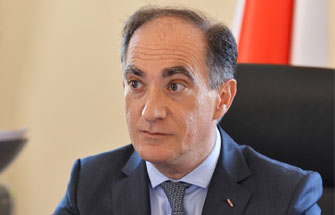Jean Castellini, Minister of Finance and Economy speaks about the management of the COVID-19 crisis in Monaco, which can be seen as a successful stress-test. Based on solid foundations, the Principality continues to build its future.
How was the pandemic managed in Monaco economically?
We reacted very quickly. In agreement with the Government of the Principality, the Monaco Association for Financial Activities (AMAF) and the Monaco Order of Accountants (OECM), financial aid schemes tailored to the companies affected economically by the crisis of COVID-19 were deployed as early as March.
The Government of the Principality quickly put in place a Guarantee Fund, a scheme (adapted to the emergency situation) of cash credits and overdraft facilities granted by the banking institutions to traders, craftspeople and companies benefiting from 100% State guarantees and thus risk-free for banks, and at 0% for borrowers. €50 million was thus lent.
Were there any other loan offers?
Yes, since 1 July, we have introduced a new loan scheme to support the business recovery, backed by a State guarantee of up to 65%. Banks must seek a guarantee from the borrower for the remaining 35%. Moreover, a 0.75% interest-rate subsidy will still be covered by the State.
Despite the violence of the crisis, do you have grounds to be reassured?
While the 2008 crisis highlighted the systemic risks that banks placed on the economy, the banking industry has now been improved. The banking sector in the Principality is motivated and efficient. It has demonstrated its ability to support all economic players (companies, traders, self-employed workers) and not just private bank clients. The excellent cooperation between the State services, the AMAF and the banks, in the best interests of the clients, should be noted.
What do you attribute this good crisis management to?
The smooth functioning of our institutions.
Before implementing measures to support and accompany economic players, the Government obviously obtained the approval of the Sovereign and his Cabinet on a very regular basis.
At the very beginning of the pandemic, the National Council voted a first amending budget giving State services the resources to deal with the crisis.
The establishment of the Joint Monitoring Committee then made it possible to share the actions of the Government with the elected Monegasque representatives.
As for relations with professionals, among them FEDEM, the Chambre Patronale du Bâtiment, UCAM and AIHM, they were characterised by prior consultation, and thus received very broad agreement before their implementation.
Hasn’t the banks’ performance been affected?
The banks in the Principality are expected to have good results in 2020. It is a demonstration of their ability to operate in a volatile environment, a very good point for the Principality. A high quality service was provided, as well as a close presence with clients – even remotely. This new way of working obviously raises questions about the number of employees required to be on site, the streamlining of work – each company and each bank will implement an appropriate policy in the future.
The National Risk Assessment (ENR) for MONEYVAL and the transposition of the 5th Anti-money Laundering Directive are on the agenda...
Indeed, they will mobilise not only a number of State services, but also economic players from all professions in the sector. Banking institutions are an important part of the anti-money laundering scheme, but they are not the only ones. The ENR encourages us to work better together, in order to demonstrate to the assessors the quality of our system: a legal framework enabling all public and private economic actors to fulfil their role in the fight against money laundering and the financing of terrorism.
What do you expect from June’s security token offerings law?
This is an important “component” for the financing of innovation in the Principality. The law allows for fundraising by legal entities using a digital recording device on a shared register, such as a Blockchain. The investor receives “tokens” in exchange for the funds he/she has invested. This type of funding will mainly concern projects related to ecology and sustainable development, in line with the Sovereign’s commitments. It is a structuring opportunity for growth, additional funding for the economy.
But is there a risk?
Thanks to the cooperation of the State services and the AMAF, a security system has been implemented: no tokens can be issued without having received a label awarded by a Joint Commission where the AMAF will be represented, as well as the Government, the DITN, the National Council, and independent experts. Thus, innovation will not create any reputational risk for the Principality. The companies selected by the Commission will open a bank account in the Principality and bring added value and jobs to Monaco. A first case review meeting will be held next September.
So, the Principality is working more than ever on its future.
Since the accession of the Sovereign Prince in 2005, and in particular since 2010, the legislative and regulatory framework has been built, with the introduction of the automatic exchange of information in tax matters and the continuous adaptation of anti-money laundering texts and practices.
To remain attractive, if investors are to continue to establish themselves in Monaco, our banking system must perform well, adopting the highest international standards possible. Our institutions work well, the relationships between the administration and the private actors are of high quality, and they are producing great results. This teamwork is the basis for the future of a modern and exemplary Principality.






